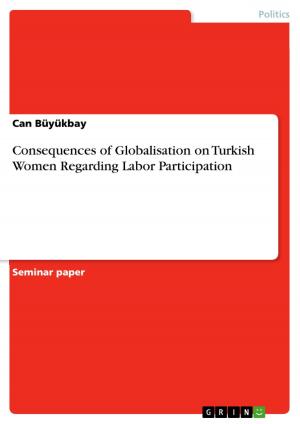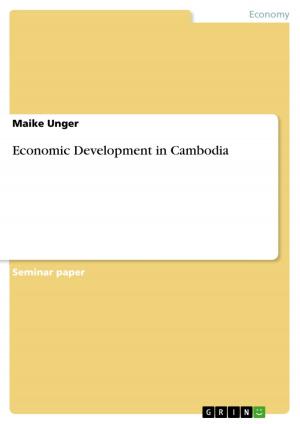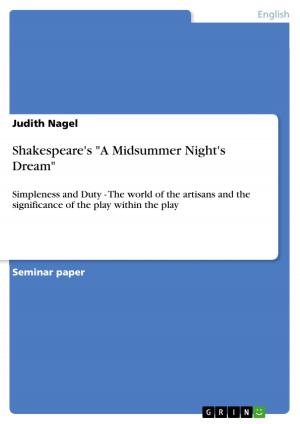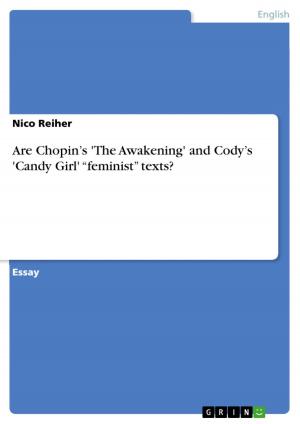Two Levels: Lewis Carroll's Alice Books as Children's Literature and Adult Fiction
Fiction & Literature, Literary Theory & Criticism, British| Author: | Jessica Schweke | ISBN: | 9783638878036 |
| Publisher: | GRIN Publishing | Publication: | December 17, 2007 |
| Imprint: | GRIN Publishing | Language: | English |
| Author: | Jessica Schweke |
| ISBN: | 9783638878036 |
| Publisher: | GRIN Publishing |
| Publication: | December 17, 2007 |
| Imprint: | GRIN Publishing |
| Language: | English |
Bachelor Thesis from the year 2007 in the subject English Language and Literature Studies - Literature, grade: 2,5, Ernst Moritz Arndt University of Greifswald, 23 entries in the bibliography, language: English, abstract: When Charles Lutwidge Dodgson decided to publish his tale Alice's Adventures in Wonderland in 1865 under the pen name Lewis Carroll, he could not have known that this little girl's great experiences in Wonderland and also in the land behind the mirror in Through the Looking-Glass and What Alice Found There , published nearly a decade later, would become so popular. Meant as presents for two of his child-friends both books developed to a reading pleasure for children as well as for adults. Numerous theater plays and film adaptations of Alice's story definitely show its fantastic impact that it has maintained until today. However, besides different film versions there are of course also different interpretations of the tale itself. The availability of different readings in their collectivity suggests that the Alice books can be understood virtually completely only by adults in reference to these diverse and numerous aspects, which will be proven during the following examination. In the subsequent B.A.-thesis I will point out various factors which indicate that Carroll's Alice is not only a book for children, if not entirely meant for adults. The allusions to the author's own life as well as Victorian culture and especially Carroll's use of words and language for example require a preoccupation with these criteria which children generally would not show. Furthermore, adults have a completely different horizon of expectations when reading any piece of literature. This set of cultural standards, assumptions, and principles shape the way in which the reader evaluates and comprehends a book. 'Such 'horizons' are subject to historical change, so that later generations of readers may see a very different range of meanings in the same work, and revalue it accordingly.' (Baldick 116)
Bachelor Thesis from the year 2007 in the subject English Language and Literature Studies - Literature, grade: 2,5, Ernst Moritz Arndt University of Greifswald, 23 entries in the bibliography, language: English, abstract: When Charles Lutwidge Dodgson decided to publish his tale Alice's Adventures in Wonderland in 1865 under the pen name Lewis Carroll, he could not have known that this little girl's great experiences in Wonderland and also in the land behind the mirror in Through the Looking-Glass and What Alice Found There , published nearly a decade later, would become so popular. Meant as presents for two of his child-friends both books developed to a reading pleasure for children as well as for adults. Numerous theater plays and film adaptations of Alice's story definitely show its fantastic impact that it has maintained until today. However, besides different film versions there are of course also different interpretations of the tale itself. The availability of different readings in their collectivity suggests that the Alice books can be understood virtually completely only by adults in reference to these diverse and numerous aspects, which will be proven during the following examination. In the subsequent B.A.-thesis I will point out various factors which indicate that Carroll's Alice is not only a book for children, if not entirely meant for adults. The allusions to the author's own life as well as Victorian culture and especially Carroll's use of words and language for example require a preoccupation with these criteria which children generally would not show. Furthermore, adults have a completely different horizon of expectations when reading any piece of literature. This set of cultural standards, assumptions, and principles shape the way in which the reader evaluates and comprehends a book. 'Such 'horizons' are subject to historical change, so that later generations of readers may see a very different range of meanings in the same work, and revalue it accordingly.' (Baldick 116)















